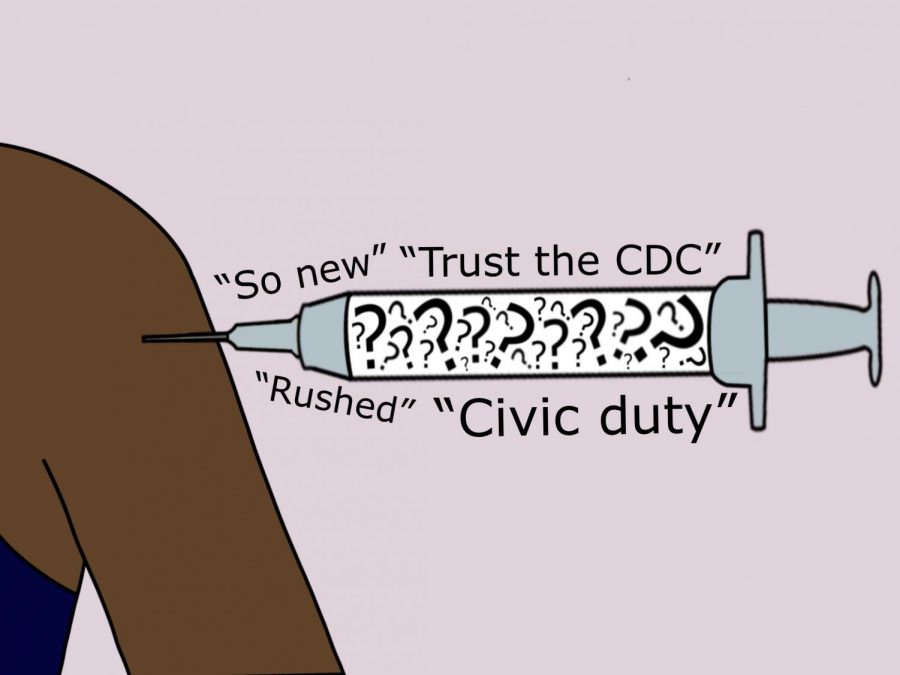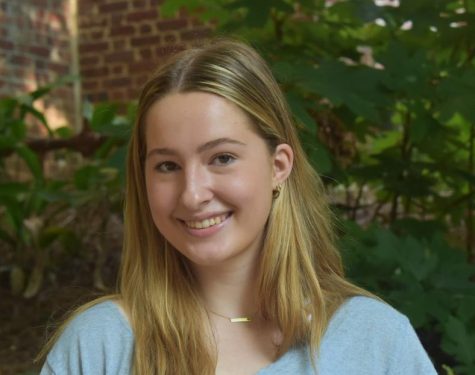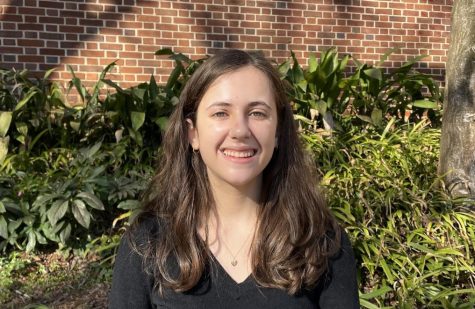Students weigh in on Covid-19 vaccine
The recent announcement of three separate vaccine candidates has sparked increased interest in coronavirus vaccines. Various factors have influenced the way Grady students feel about getting the vaccine.
December 8, 2020
As Covid-19 cases continue to rise in the United States, many are looking to vaccine development as a fast solution to the pandemic. The recent announcement of three separate vaccine candidates developed by the biotechnology companies Moderna and AstraZeneca and pharmaceutical company Pfizer have sparked increased interest in coronavirus vaccines.
The vaccine by Moderna has shown to be 94.5 percent effective and Pfizer’s has shown to be more than 90 percent effective. AstraZeneca’s vaccine showed to be 70 percent effective. For comparison, the flu vaccine is 40 to 60 percent effective.
A survey by Gallup News said that roughly 6 in 10 Americans would agree to get the Covid vaccine. This number has been increasing since Oct..
Various factors have influenced the way Grady students feel about getting the vaccine.
“If there was a coronavirus vaccine in the future, I would get it after it’s been used many times and has been proven that nothing is wrong with it,” senior Isabella McDonald said. “But right now, I would not get it just because it’s so new, and you just don’t know what’s going to happen in a couple years.”
Over the past few months, President Donald Trump has pushed the Food and Drug Administration (FDA) to move faster in the vaccine process. If the FDA approves Moderna’s vaccine, shots could be available as early as Dec. 21. This has also been a source of concern to students.
“I think the government’s involvement in the coronavirus vaccine is very rushed, like they are really trying to get it done so the people can be happy,” junior Alaya Foote said. “It’s cool that they’re thinking about the people, but I think they’re rushing it too much where it’s not okay, and it’s kind of scaring some people.”
Despite some students’ hesitancy about the vaccine, others see no problem with it.
“I would definitely get vaccinated,” junior Jack Collins said. “I’ve been vaccinated in the past and, although coronavirus is a new disease, I don’t see a risk in getting vaccinated. Honestly, I’ll do whatever the CDC (Center for Disease Control) says is best. I feel like the standard should be to trust the CDC; they are trained professionals.”
Senior Andre Myette sees the positives and negatives of the government’s hand in the process.
“I think that it is good that the government is involved in making sure that customers aren’t being taken advantage of and there’s no price gouging and there’s no inequity in the vaccine development process,” Myette said. “But, I also think that the government should stay out of the way and let companies and businesses do what they do best and innovate and look for that vaccine. I am kind of on both sides.”
The racial disparity in American healthcare has also stood out to students.
“The Trump administration has done nothing to dissolve the disparity but has exasperated the problem,” Myette said. “Congress, the courts and the incoming president need to work on ensuring the vaccine gets to everyone, especially Black and Hispanic Americans without access to healthcare, those that the system works against.”
Junior Nola Pickering agrees.
“Ethnic minorities have been hit the hardest across the pandemic; the data across the board shows that,” Pickering said. “That is due to long-term impacts of systemic racism. More people are dying at a disproportionate rate. That is due to the inactivity of the Trump administration.”
Pfizer’s vaccine is estimated to distribute 25 million doses to the United States. The vaccine requires two doses, meaning 12.5 million Americans could get vaccinated. Pfizer expects to produce globally up to 1.3 billion doses in 2021.
“I think that the first people to get it should be the people who have already contracted the virus, but if they can’t get the vaccine, then it should go to people who are becoming sick or elderly people or people who have underlying health issues or people who just want to get it,” McDonald said.
The United Kingdom, which includes England, Wales, Scotland and Northern Ireland, said on Dec. 2 it would be the first country to grant Pfizer’s coronavirus vaccine for emergency use. Georgia Gov. Brian Kemp said today that Georgia will have the vaccine in the next week to 10 days. The first doses will go to healthcare workers and long-term care residents.
Junior Francesca Ruhe’s grandmother, who lives in France, will receive the vaccine later this month because she is high-risk.
“The disparity between the U.S. and European countries is crazy,” Ruhe said. “Europe is taking basic common sense measures, like a uniform mandatory lockdown and vaccine stockpiling, to minimize deaths, and we’re over here with hospitals overflowing and a very vocal group that doesn’t even believe Covid exists.”
Ruhe is mainly frustrated with the U.S. government’s handling of the pandemic, she said.
“It does make me mad that we have the resources to easily deal with [Covid-19], yet, currently the U.S. government just doesn’t care in the slightest,” Ruhe said.
Questions surrounding the efficacy of widespread vaccination are rising as people consider the possibility of returning to a sense of normalcy.
“I am vaccinated, and I believe that vaccines should be mandatory,” junior Daniela Restrepo said. “This does affect my stance on the coronavirus vaccine because I believe that vaccines are extremely important for maintaining a healthy and stable community as well as keeping it safe. Not being vaccinated puts those who are too young or unable to be vaccinated at extreme risk which, in my opinion, is selfish.”
Myette agrees that vaccines should be mandatory.
“I think people should definitely get the vaccine,” Myette said. “I think it’s a civic duty to keep others around you safe. We live in a democracy where people should have the right to make choices about their own body and their own health decisions. But, when it comes to vaccines, if you’re going out in public and you’re not vaccinated, that doesn’t just affect you, that affects others around you.”









